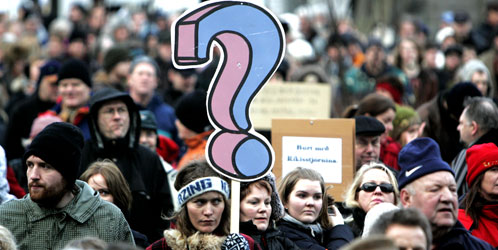The vast majority of Western people say dreams since 2008 " no to the banks, but nobody has dared to do so. No one except the Icelanders, who have carried out a peaceful revolution that has managed not only to overthrow a government and draft a new constitution, if not imprison those responsible for the country's economic debacle.
9 people arrested in London and Reikjiavik (capital of Iceland) for their responsibility in the financial collapse of Iceland in 2008, a deep crisis which developed into an unprecedented public reaction that changed the course of the country.
It has been a revolution without arms of Iceland, the country that hosts the oldest democracy world (since 930), and whose citizens have managed to change based on events and pans. And why the rest of the Western countries have not even heard?
Icelandic citizen pressure succeeded not only overthrow a government if not drafting a new constitution (in process) and put in jail the bankers responsible for the crisis the country. As they say, if you ask politely things is much easier to get them.
This quiet revolutionary process has its origins in 2008 when the Icelandic government decided to nationalize the three largest banks, Landsbanki the Kaupthing and Glitnir, whose clients were mainly British, American and American.
After entering the state in the capital's official currency (krona), fell and bag suspended its activity after a 76% collapse. Iceland went bankrupt and to save the situation, the International Monetary Fund (IMF) injected U.S. $ 2,100 million and the Nordic countries helped with another 2,500 million.
Great small victories of ordinary people
While banks and local and foreign authorities desperately seeking economic solutions, the Icelandic people took to the streets and their persistent daily demonstrations outside parliament of Riekjavik led to the resignation of Prime Minister Geir conservative H. Haarde, and his entire government in a block.
citizens also demanded early elections to be convened, and they succeeded. In April he was elected by vote of a coalition government formed by the Social Democratic Alliance and the Left Green Movement, headed by new Prime Minister, Jóhanna Sigurðardóttir .

Throughout 2009 the Icelandic economy continued in a precarious situation (close the year with a drop of 7% of GDP) but, despite this, Parliament proposed repayment of debt Britain and the Netherlands by payment of 3,500 million euros, a sum to be paid every month Icelandic families for 15 years at 5.5% interest.
The measure again provoked the wrath of the Icelanders, who returned to the streets demanding that, at least, that decision was put to a referendum . Another new little big victory for street protests: in March 2010 that vote was held and an overwhelming 93% of the population refused to repay the debt, at least in these conditions.
This got the creditors to rethink the deal and the best, offering 3% interest and payment to 37 years. Even that was enough, the current president, to see that Parliament approved the agreement by a narrow margin, decided last month not approve it and call back to the Icelanders to vote in a referendum to be they who have the last word.
fleeing bankers fear
back to the tense situation in 2010, while the Icelanders refused to pay a debt he had incurred financial sharks without asking, the coalition government had launched an investigation to settle the legal responsibilities of the fatal economic crisis had already been arrested several bankers and top executives closely linked to risk operations.
Interpol, meanwhile, had issued an international arrest warrant against the president of Parliament, Sigurdur Einarsson . This situation led bankers and executives, frightened, left the country en masse.
In this context of crisis, we chose an assembly to draft a new constitution that would reflect the lessons learned and to replace the current one, inspired by the Danish constitution.
To do this, instead of calling experts and politicians, Iceland has decided to appeal directly to the people, sovereign, after all, of the laws. More than 500 Icelanders were presented candidates to participate in this exercise in direct democracy and a constitution, of which 25 citizens were elected without party affiliation who include lawyers, students, journalists, farmers, union representatives ...
Among other developments, this constitution is called to protect like no other freedom of information and expression in the so-called modern Icelandic Initiative Media , A bill that aims to make the country a safe haven for investigative journalism and freedom of information which protect sources, journalists and Internet providers that host news reporting.
be the people, for once, to decide on the future of the country while bankers and politicians attend (some from prison) to transform a nation, but from the sidelines.
0 comments:
Post a Comment